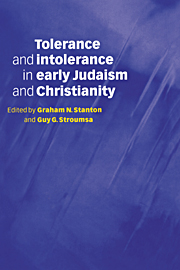Book contents
- Frontmatter
- Contents
- List of contributors
- List of abbreviations
- Introduction
- 1 Intolerance and martyrdom: from Socrates to Rabbi ‘Aqiva
- 2 The other in 1 and 2 Maccabees
- 3 The pursuit of the millennium in early Judaism
- 4 Conservative revolution? The intolerant innovations of Qumran
- 5 Who was considered an apostate in the Jewish Diaspora?
- 6 Why did Paul persecute the church?
- 7 Paul and the limits of tolerance
- 8 Philo's views on paganism
- 9 Coexisting with the enemy: Jews and pagans in the Mishnah
- 10 Tertullian on idolatry and the limits of tolerance
- 11 The threefold Christian anti-Judaism
- 12 The intertextual polemic of the Markan vineyard parable
- 13 Jews and Jewish Christians in the land of Israel at the time of the Bar Kochba war, with special reference to the Apocalypse of Peter
- 14 The Nazoreans: living at the boundary of Judaism and Christianity
- 15 Justin Martyr's Dialogue with Trypho: group boundaries, ‘proselytes’ and ‘God-fearers’
- 16 Accusations of Jewish persecution in early Christian sources, with particular reference to Justin Martyr and the Martyrdom of Polycarp
- 17 Early Christians on synagogue prayer and imprecation
- 18 Messianism, Torah and early Christian tradition
- 19 Jewish and Christian public ethics in the early Roman Empire
- Postscript: the future of intolerance
- General bibliography
- Index
8 - Philo's views on paganism
Published online by Cambridge University Press: 08 March 2010
- Frontmatter
- Contents
- List of contributors
- List of abbreviations
- Introduction
- 1 Intolerance and martyrdom: from Socrates to Rabbi ‘Aqiva
- 2 The other in 1 and 2 Maccabees
- 3 The pursuit of the millennium in early Judaism
- 4 Conservative revolution? The intolerant innovations of Qumran
- 5 Who was considered an apostate in the Jewish Diaspora?
- 6 Why did Paul persecute the church?
- 7 Paul and the limits of tolerance
- 8 Philo's views on paganism
- 9 Coexisting with the enemy: Jews and pagans in the Mishnah
- 10 Tertullian on idolatry and the limits of tolerance
- 11 The threefold Christian anti-Judaism
- 12 The intertextual polemic of the Markan vineyard parable
- 13 Jews and Jewish Christians in the land of Israel at the time of the Bar Kochba war, with special reference to the Apocalypse of Peter
- 14 The Nazoreans: living at the boundary of Judaism and Christianity
- 15 Justin Martyr's Dialogue with Trypho: group boundaries, ‘proselytes’ and ‘God-fearers’
- 16 Accusations of Jewish persecution in early Christian sources, with particular reference to Justin Martyr and the Martyrdom of Polycarp
- 17 Early Christians on synagogue prayer and imprecation
- 18 Messianism, Torah and early Christian tradition
- 19 Jewish and Christian public ethics in the early Roman Empire
- Postscript: the future of intolerance
- General bibliography
- Index
Summary
The question of cultural boundaries in antiquity, during the period when the Hellenistic commonwealth embraced many nations and established Koine-Greek as the lingua franca of both political and intellectual discourse, is extremely complex. Are we to imagine a kind of cultural amalgamation, in which national, cultural and religious boundaries recede to the extent that a felicitous syncretism replaces separate self-definitions? On this view, actual contact between different cultures diminishes the boundaries between them, and the dominant culture tends to provide an integrating framework for a variety of other cultures. Alternatively, we may suppose that real coexistence of nations is based on interculturality, and thus involves clear identities and boundaries, on the basis of which significant dialogue and cultural exchange can take place. On this view, cultural contacts are likely to stimulate renewed assertions of national and cultural boundaries – far more so than would have been necessary in a culturally homogeneous environment. Tolerance would thus be based precisely on the mutually accepted rejection of what comes to be regarded by each group as ‘foreign’.
The case of Jewish Hellenism is in this respect especially interesting, because the encounter between monotheism and paganism obviously demands special solutions to the question of cultural boundaries. Philo, the most illustrious member of the Jewish community in Hellenistic Alexandria, was not the first to attempt an answer to the challenge of this encounter. In the first known generation of Jewish acculturation to Hellenistic Egypt, Philo's predecessor Artapanus proposed an approach which remained unparalleled in its radicalness and thus set the parameters for subsequent discussions.
- Type
- Chapter
- Information
- Tolerance and Intolerance in Early Judaism and Christianity , pp. 135 - 158Publisher: Cambridge University PressPrint publication year: 1998
- 1
- Cited by



